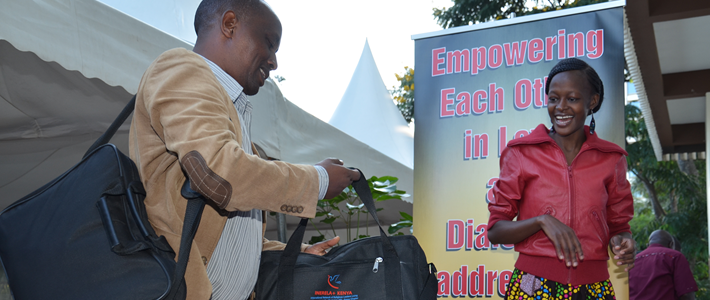
People living with HIV in Kenya are still subject to high levels of stigma and some still shun treatment as a result. A national survey based on “lived experiences” rated stigma and discrimination in Kenya at 45%.
The findings of the stigma index study were presented during a national dialogue between religious leaders and people living with HIV that took place on 18 February. Over 70 people gathered in Nairobi to exchange views and to lay strategies on how to defeat stigma and discrimination in Kenya and how to address. The theme of the meeting was “Empowering each other in love and dialogue; addressing HIV and AIDS stigma”.
The dialogue aimed to understand the evidence of stigma from a faith perspective and to reflect on changes that need to be made at individual, organisational and institutional levels.
One key priority they identified was the revival of information and awareness about HIV for religious leaders, including the drafting of theologically sound and stigma-free messages.
“What I loved about the meeting was the joint actions agreed upon by religious and faith leaders to work together to address stigma,” said Florence Anam of the National Empowerment Network of People living with HIV/AIDS in Kenya (NEPHAK).
Speaking to AJANews, Florence continued: “Now hopefully people living with HIV will have a more enabling environment for improved uptake of prevention and treatment strategies, and this will improve their quality of life and positively influence the HIV response.”
Faith-based institutions and organisations have a big stake in the AIDS response in Kenya. Not only do they provide 42% of the country’s healthcare, they also represent recognised moral authority – as Florence put it, “Africans live their life in faith”. And they are the first port of call for countless people who have been somehow affected by the epidemic.
Florence said the framework of this initiative – evidence leading to dialogue and then to joint action – gave people living with HIV the chance to present evidence of the stigma they face in the community, most of which is not reported or addressed, because there are no legal structures to do so.
The survey shows that certain geographic areas in Kenya are much more affected. “There is no static,” said Florence. “If you go to places where prevalence is low, like the north-east, there are huge levels of stigma. People are ostracized. But if you go to Homabay County, which has the 2nd highest prevalence in Kenya after Nairobi, it’s a different story. You ask women ‘are you stigmatised?’ And they reply ‘By who? So many of us are HIV-positive’.”
The participants at the dialogue heard how stigma and discrimination heap unhappiness and stress on people living with HIV and attack their self-esteem. Not a few have lost jobs for being positive. Fear of being ‘discovered’ will lead many to seek treatment far from home to make sure they are not seen by anyone they know, a strategy that costs them so much time and money. Others simply opt not to go to their clinic and not to take their medication. The result can be fatal.
Jo lives in a neighbourhood on the outskirts of Nairobi. She admits she is influenced by the fear of stigma. “When I go to the clinic, I’m afraid someone will see I’m HIV-positive because our registration cards are a different colour from the outpatient ones,” she says. “At home I hide my medicines because I don’t want my house girl to find them. But sometimes I might forget. If she realises I am HIV-positive, she may refuse to take care of my child when I go to work. And she may start spreading stories and when I walk along the road, people will look at me. I don’t want this to happen so I keep it as secret as I can. The pressure can be too much.”
Those present at the dialogue agreed that churches and other faith-based institutions had a significant role to play in fighting stigma and discrimination by addressing HIV-related misconceptions among their congregants.
Religious leaders were also urged to take on another worrying problem: the high infection rate among young people in Kenya. Their attention was drawn to areas where they can make a difference: comprehensive education about sexuality; tackling alcohol and drugs abuse; and disseminating correct information to young people who nowadays are only a click away from so much inaccurate and even misleading data.
Adolescents and young people worldwide represent a rapidly growing share of people living with HIV. In 2013 alone, 670,000 young people were newly infected, of whom 250,000 were adolescents. Eastern and Southern Africa account for 64% of all the world’s 2.1 million adolescents living with HIV. In the dialogue, one particularly worrying statistic to emerge is that 33% of Kenyan girls are raped by the time they reach 18.

